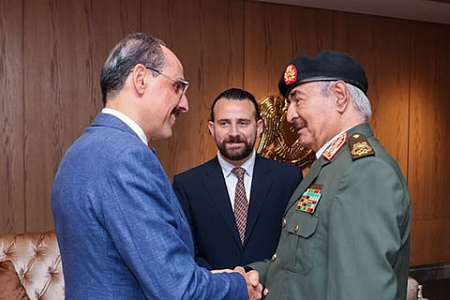
In a stunning diplomatic realignment, Turkey’s intelligence chief, Ibrahim Kalin, has held talks with Khalifa Haftar, the powerful commander of the eastern-based Libyan National Army (LNA). The high-stakes meeting in Benghazi signals a dramatic pivot for Ankara, which once actively opposed Haftar’s influence. Turkey is now reportedly seeking to persuade its former adversary to endorse a contentious 2019 maritime agreement, a move that would legitimize Ankara’s expansive claims in the resource-rich Eastern Mediterranean.
This landmark discussion is the culmination of a recent warming of relations between the two former rivals. It follows a historic visit by a Turkish naval frigate to the port of Benghazi and a trip to Ankara in April by Haftar’s son and likely successor, Saddam Haftar. During his visit, Saddam Haftar met with Turkey’s Defense Minister to discuss military cooperation, with regional reports suggesting the LNA is considering purchasing Turkish defense technology—the very same hardware Ankara previously supplied to Haftar’s rivals in Tripoli.
At the heart of Ankara’s diplomatic gambit is the 2019 maritime boundary accord, originally signed with Libya’s internationally recognized government in Tripoli. The deal effectively redraws the map of maritime influence, creating an exclusive economic corridor between Turkey and Libya while ignoring the claims of Greece and Cyprus. The agreement has been widely condemned by Athens, Nicosia, and the European Union. Securing Haftar’s approval would not only bolster Turkey’s legal and political standing but also likely provoke fresh criticism from European capitals.
Ankara’s outreach to Haftar may also be a strategic move to gain leverage over the fractious government in Tripoli. Western Libya has been plagued by instability and violent clashes between rival militias, highlighted by recent assassinations and attacks on senior commanders. In contrast, the LNA-controlled east offers a semblance of stability, making Haftar’s command an increasingly pragmatic partner for nations seeking to secure their interests in the divided country.
Analysts suggest Turkey is shifting from a one-sided policy to a more comprehensive strategy of engaging all Libyan factions. By fostering ties with eastern business communities, the LNA, and even southern tribal groups, Ankara aims to create broader room for maneuver and secure the necessary cross-country ratification for its military presence in western Libya. However, this strategy is not without risks, as it navigates the complex internal power struggles within Haftar’s own family and the LNA, as well as the unpredictable allegiances of powerful regional tribes.
